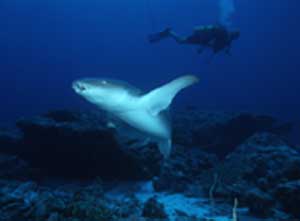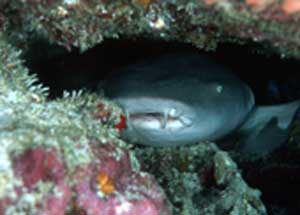|
|
Commercial Shark Fishing
Around 100 million sharks
a year are caught, many of them are finned as the meat is considered poor.
The fins are commonly sold to the East especially China and Japan. 'Finning'
involves cutting off the dorsal, pectoral and caudal fins with a sharp
instrument and then (often) throwing the still living carcass back into
the sea. Strangely this is commonly legal. Commercial shark fishing also
occurs in the West notably America and Spain, while porbeagle sharks caught
in England are sent to France. John and Sune Nightingale went to the Spanish
fishing port of Vigo managing to capture photos and images documenting
a catch of around 4000 sharks every day. Find out more.
Although the Spanish do use shark meat most of the sharks caught were
immature and the industry there is therefore unsustainable. Find out more
about Finning
 Fishermen are turning to sharks
because of the decline in other fish stocks and because demand has increased
(the greater wealth of China means shark becomes more affordable). It is
very likely that what happened to the cod will also happen to the shark.
As sharks are fished out in the East shark fins are increasingly being exported
from the west were there are as yet no real quotas. 27% of fins imported
to Hong Kong now come from Europe. John and Sune Nightingale interviewed
the plymouth M.A.F.F. representatives. Weight and species of fish caught
are all routinely recorded, but when it comes to shark only the total weight
is recorded with shark" written next to it. This is a very dangerous
situation since there is no record of the numbers of any species of shark
being caught, and it is therefore very difficult to prove a decline in numbers
of any shark species.
Fishermen are turning to sharks
because of the decline in other fish stocks and because demand has increased
(the greater wealth of China means shark becomes more affordable). It is
very likely that what happened to the cod will also happen to the shark.
As sharks are fished out in the East shark fins are increasingly being exported
from the west were there are as yet no real quotas. 27% of fins imported
to Hong Kong now come from Europe. John and Sune Nightingale interviewed
the plymouth M.A.F.F. representatives. Weight and species of fish caught
are all routinely recorded, but when it comes to shark only the total weight
is recorded with shark" written next to it. This is a very dangerous
situation since there is no record of the numbers of any species of shark
being caught, and it is therefore very difficult to prove a decline in numbers
of any shark species. 
Shark's-Fin Soup
Shark's-fin soup is like
the caviar of the East. Chinese and Japanese people are the biggest consumers
of sharks fin. It is served to impress business clients, for important
family gatherings, etc. The fin is dried and then processed. This involves
scraping and bleaching at the end of which all that is left is "fin-net".
Fin-net is not cartialage, it is more elastic and looks a little like
noodles. The fin-net is boiled with chicken or pork stock, mussels, and
other ingredients to give it flavour. Prices vary according to fin size
and quality. A small bowl of shark's-fin soup can cost around £30 (English).
Ironically in many of the places where the sharks are caught the locals
consider the meat poor and do not eat it. Often the bodies of whale sharks
or manta rays are processed into fish scallops or tinned and sold very
cheaply; it is the fin that is worth money. It is a widely held belief
that by eating shark's-fin you can stop yourself getting cancer, which
is why people will spend so much money on it. Shark cartialage pills are
promoted as being healthy and helping to prevent cancer. If sharks were
less prone to cancer than humans, it might be due to the fact that they
don't drink, smoke, or work with asbestos. This resistance is presumably
passed on to the consumer. Perhaps arctic explorers would do well to feed
up on penguin meat before they leave since this might give them better
resistance to low temperatures. But
sharks do get cancer, indeed they even get cancer of the cartialage.
Ironically it is very likely that a lot of shark meat is in fact toxic;
being apex predators sharks quickly accumulate toxic compounds like DDT
and PCB's. It is very possible that shark meat is as toxic as whale and
dolphin meat in Japan.
Why is this a problem?
The fact that sharks are
being killed in greater numbers poses more problems than the loss of species.
Many sharks are the apex pedators; they come top in the food chain. They
regulate fish populations and, by catching the weaker slower fish, help
keep the populations they feed on healthy. If you take the apex predator
out of a food chain it can cause amplified oscillations within the rest
of the chain. By killing a few sharks you let a greater number of their
prey survive and breed, which then eat a greater number of their prey,
etc. What appears to be a minor change (removing the top link in the food
chain) can have massive effects right down to the bottom of the chain.
It's a little like a glass in the middle of a spinning record deck; if
you nudge it just slightly it can start to rock, it will sway backwards
and frowards until, eventually, it falls.
If you want to find out
more about sharks and shark conservation issues check out the Shark
Trust website.
Sune Nightingale
|
|
|


